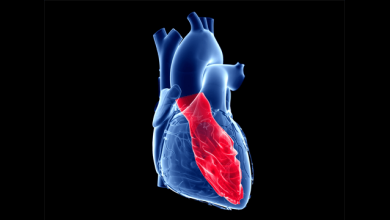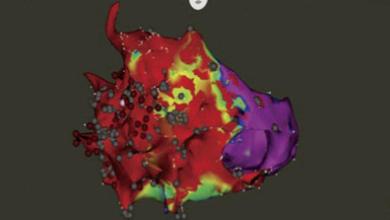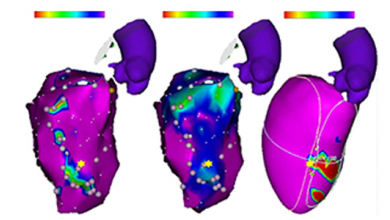Search results
Author(s):
Hongwu Chen
,
Kit Chan
,
Sunny S Po
,
et al
Added:
3 years ago
Ventricular tachycardia (VT) originating from the Purkinje system is the most common type of idiopathic left ventricular tachycardia (ILVT), especially among young Asians.1,2 It usually has a benign course. Research over the past two decades has deepened our understanding of the anatomy of the Purkinje system and the mechanisms of ILVT. This review focuses on the research history and anatomy of…
View more
Author(s):
Rahul K Mukherjee
,
Louisa O’Neill
,
Mark D O’Neill
Added:
3 years ago
Recurrent ventricular tachycardia (VT) in patients who have an implantable cardioverter-defibrillator (ICD) with subsequent shocks is associated with reduced quality of life and an adverse prognosis. Pharmacological treatments are associated with significant side-effects. Catheter ablation has been used to reduce the number of ICD therapies in patients with ischaemic and non-ischaemic…
View more
Author(s):
Adam J Graham
,
Michele Orini
,
Pier D Lambiase
Added:
3 years ago
Recurrent episodes of ventricular tachycardia (VT) in patients with structural heart disease are associated with increased mortality and morbidity, despite the life-saving benefits of implantable cardiac defibrillators (ICDs).1,2 Because ICD therapies are abortive and do not alter the underlying arrhythmogenic substrate, their reduction becomes important, especially as recurrent shocks can cause…
View more
Author(s):
Benjamin L Freedman
,
Timothy R Maher
,
Madison Tracey
,
et al
Added:
10 months ago
Author(s):
Roland R Tilz
,
Charlotte Eitel
,
Evgeny Lyan
,
et al
Added:
3 years ago
Ventricular tachycardia (VT) is associated with increased mortality in patients with a history of MI. ICD implantation is currently the standard of care for the prevention of sudden cardiac death, and contributes to a reduction of total mortality.1 Despite effective treatment of ventricular arrhythmias with the use of anti-tachycardia pacing (ATP) or shocks, ICDs do not prevent VT. Furthermore,…
View more
Author(s):
Krystien VV Lieve
,
Arthur A Wilde
,
Christian van der Werf
Added:
3 years ago
Catecholaminergic polymorphic ventricular tachycardia (CPVT) is a rare but severe genetic cardiac arrhythmia disorder. Clinically, CPVT most often presents in childhood with symptoms such as syncope or sudden cardiac death due to polymorphic ventricular tachycardia (VT) or ventricular fibrillation typically triggered by exercise or emotions in the absence of structural heart disease.1
Mutations…
View more
Author(s):
Abhishek Bhaskaran
,
John Fitzgerald
,
Nicholas Jackson
,
et al
Added:
3 years ago
Author(s):
Jackson J Liang
,
Pasquale Santangeli
,
David J Callans
Added:
3 years ago
Ventricular tachycardia (VT) is a significant cause of morbidity and mortality in patients with structural heart disease (SHD). While implantable cardioverter-defibrillators (ICDs) have been shown to be effective in preventing sudden death due to ventricular arrhythmias, they are not able to prevent recurrent VT episodes. Antiarrhythmic drugs (AADs) have some demonstrated efficacy in preventing…
View more
Author(s):
Daniele Muser
,
Simon A Castro
,
Jackson J Liang
,
et al
Added:
3 years ago
The role of catheter ablation (CA) in the management of ventricular tachycardia (VT) is becoming increasingly relevant, having repeatedly shown its superiority to medical therapy in reducing the arrhythmic burden, thus improving prognosis and quality of life in patients with structural heart disease presenting with VT.1–4 In such patients, recurrent VT and heart failure (HF) status are connected…
View more
Author(s):
Ling Kuo
,
Jackson J Liang
,
Saman Nazarian
,
et al
Added:
3 years ago
Catheter ablation has been increasingly used as a treatment for refractory ventricular tachycardia (VT) in patients with non-ischaemic cardiomyopathy (NICM). However, ablation outcomes tend to be quite variable because of the heterogeneity of the aetiology for the NICM and associated VT substrate in these patients.1–3 Patients with NICM can be sub-classified based on specific genotypic and…
View more
















 « First
« First